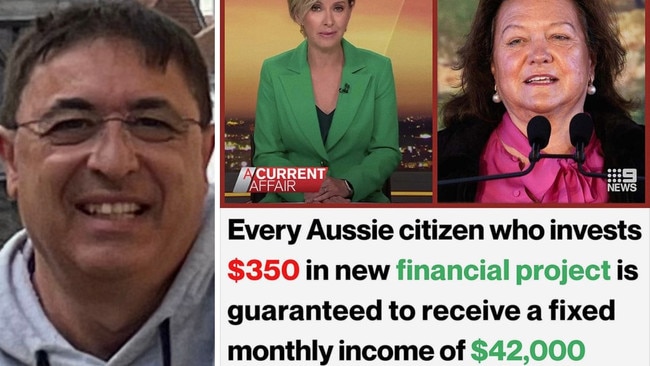‘I don’t want her to leave me’: Victorian man loses $183,000 in Facebook scam
A former Victorian real estate agent has been unable to bring himself to tell his wife that he lost $183,000 to scammers. Now he’s speaking out in the hope his story warns others.

Former real estate agent Joe Pace from regional Victoria lost $183,000, almost everything he had for his looming retirement, to scammers after clicking on a fraudulent Facebook ad.
“That was all my super, basically. It’s hard to live with, I wake up every day cursing myself,” Mr Pace said.
Married for 43 years, Mr Pace, who now works at a supermarket, hadn’t yet been able to bring himself to tell his wife about the scam when he spoke to The Australian.
“I don’t know how to face her. I don’t want her to leave me for what I’ve done,” he said.
Scam-demic: you're the prey

Myanmar scam ties to SE Asia kingpins
A new report outlines a transnational network of businesses built by the Myawaddy Border Guard Force in Myanmar that protects and profits from Chinese criminal syndicates operating online scam centres.

How Asia’s brutal online scam factories reel in Aussies
Chinese-run ‘scam universities’ are training enslaved workers how to fleece Australians out of their life savings. Inside their walls, a modern horror story is unfolding. WARNING: Graphic content

Aussies ‘kept in dark’ over mass scam network
A crime syndicate used scam ads featuring celebrities including Eric Bana to fleece thousands of Australians out of $200m – and ASIC is accused of failing to protect victims.

‘I don’t want her to leave me’: Savings lost to this Facebook scam
A former Victorian real estate agent has been unable to bring himself to tell his wife that he lost $183,000 to scammers. Now he’s speaking out in the hope his story warns others.

ASIC silent on scam which ripped off 34,000 Aussies
One of the biggest scam syndicates to ever attack Australia - which fleeced victims out of more than $200m - is almost invisible on the corporate regulator’s investor alert list.

AI rip-offs from Asia ‘terrifying’
Artificial intelligence is transforming the cyberscam landscape and governments are struggling to keep up.
But he was determined to speak out to warn others, particularly older Australians, and to raise his concerns about the failure of social media giants like Facebook’s owner Meta to stop the spread of scams on their sites.
In February last year, Mr Pace, 64, was researching cryptocurrencies online after hearing about friends’ investments and “the money they were making”.
On Facebook, he saw an ad for a scheme purportedly backed by billionaire Gina Rinehart and other prominent Australians.
He clicked on the link out of curiosity and provided his contact details.
Within half an hour, he was contacted by a well-spoken and confident senior manager named “David James” from “Oneupmarkets”, who claimed to be in London.
Days later, and with the “help” of another trader he was put on to, his initial investment of $2800 in a cryptocurrency investment scheme had multiplied to $50,000 on a platform that he now realises was entirely fraudulent.


Sceptical, he asked for his deposit back and to close his account.
Many phone calls later, he was convinced by the scheme’s promoters the platform was genuine.
Four months later, the scammers helped him set up a self-managed super fund to get access to his retirement savings. He transferred tens of thousands of dollars of his super at a time, until there was nothing left.
All the while, he was coached by the scammers on what to say to his bank, ANZ, when it tried to block the transfers due to suspicions he was caught in a scam.
“The scammer kept saying to me … `just tell them it’s your money, you can’t stop me using my money’,” he said.
He only realised it was a scam after trying to withdraw some of the funds.
His account, once brimming with “profits”, was suddenly shut down.
In a continuation of the fraud, he was told he would have to pay more to access his money.
“I was absolutely devastated. You work hard all your life to get what you have, and then you just lose it like that,” he said.
“It sounded so real. These people are very, very good at what they do.”
Mr Pace contacted private investigators IFW Global, who concluded the scam involved a Filipino woman and Israeli man, working out of a city in the Philippines.
Mr Pace said he believed older people were particularly vulnerable to scams, being from generations that grew up without having to navigate internet fraud that was becoming increasingly sophisticated.
He is scathing of tech billionaire Mark Zuckerberg’s Facebook and of the federal government for not doing enough to protect Australians.
The scam was “still going now”, he said.
“I still open my Facebook and it’s always there,” he said.
“The Australian government has got no regulation about what goes into Facebook. It’s so easy to fall into and I actually blame the laws of this country, because they’re letting stuff like this go through.
“Having this on Facebook, especially ‘promoted’ by (fake images of) Gina Rinehart, people like me are getting caught in these traps.”




To join the conversation, please log in. Don't have an account? Register
Join the conversation, you are commenting as Logout